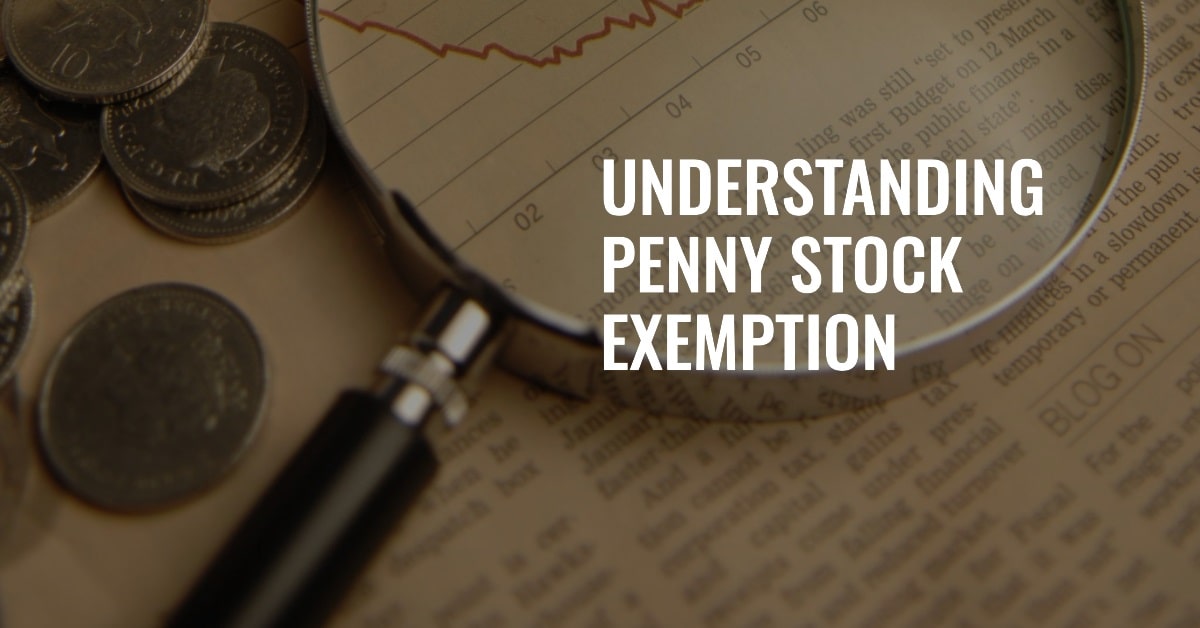Introduction
Penny stocks, often referred to as low-priced stocks, are shares of small companies that trade at a relatively low price per share. These stocks are often considered high risk due to their volatility and lack of regulation. However, there is a category within the penny stock market known as penny stock exempts.
Penny stock exempt refers to stocks that are exempt from certain regulations imposed on other penny stocks. This exemption allows for more flexibility in trading and can present unique opportunities for investors.
In this article, we will explore what penny stock exempt means, the benefits and risks associated with trading penny stock exempts, and the qualifications for participating in this market.
What is a Penny Stock?
A penny stock is a term used to describe low-priced stocks that typically trade below $5 per share. These stocks are often issued by small or micro-cap companies with relatively low market capitalization. Penny stocks are considered to be highly speculative investments due to their low price, limited trading volume, and lack of financial reporting requirements.
Investing in penny stocks can be attractive to some investors because of the potential for high returns. However, it is important to note that these stocks are also associated with high risks, including the potential for fraud, manipulation, and illiquidity. As a result, the Securities and Exchange Commission (SEC) has established regulations to protect investors and promote market integrity.
What is Penny Stock Exempt?
When it comes to investing in the stock market, there are various rules and regulations in place to protect investors and maintain the integrity of the market. One such regulation is the concept of penny stock exemptions. Penny stock exempt refers to a specific type of stock that is exempt from certain reporting and disclosure requirements that apply to other stocks.
One of the main benefits of trading penny stock exempts is that it allows investors to participate in the stock market without having to comply with the same level of regulations that apply to other stocks. This can be particularly appealing to small investors who may not have the resources or expertise to navigate the complex regulatory landscape.
In order to qualify for trading penny stock exempts, companies must meet certain criteria. These criteria can vary depending on the regulatory framework in place, but generally include factors such as the company’s market capitalization, the number of shareholders, and the company’s financial statements.
It’s important to note that trading penny stock exempts is not without risks. These stocks are often considered highly speculative and can be subject to extreme price volatility. Additionally, the lack of regulatory oversight means that there may be a higher risk of fraud or manipulation in the market for penny stock exempts.
How to Qualify for Trading Penny Stock Exempts
In order to qualify for trading penny stock exempts, there are certain requirements that need to be met. These requirements are put in place to protect investors and ensure that trading is done in a fair and regulated manner. Here are some of the qualifications:
- Net Worth Requirements: Some jurisdictions may require traders to meet a certain net worth threshold before they are eligible to trade penny stock exempts. This is to ensure that traders have a certain level of financial stability and can absorb any potential losses that may occur.
- Income Requirements: Similar to net worth requirements, some jurisdictions may also require traders to have a minimum annual income in order to trade penny stock exempts. This is to establish that traders have a steady source of income and can afford the risks associated with trading low-priced stocks.
- Accredited Investor Status: In certain cases, traders may need to be classified as accredited investors in order to qualify for trading penny stock exempts. Accredited investors are individuals or entities that meet specific criteria related to their net worth, income, or professional experience. This classification is often required to ensure that traders have a certain level of financial sophistication and understanding of the risks associated with trading penny stocks.
- Compliance with Securities Regulations: Traders must comply with all applicable securities regulations and rules imposed by the stock exchanges they trade on. This includes disclosing any relevant information about the stocks they trade, as well as adhering to any reporting requirements.
It is important to note that the specific qualifications and requirements may vary depending on the jurisdiction and the stock exchange rules. Traders should thoroughly research and understand the regulations in their specific jurisdiction before attempting to trade penny stock exempts.
Benefits of Trading Penny Stock Exempts
Trading penny stock exempts can offer several advantages for investors. Here are some of the key benefits:
- Potential for High Returns: Penny stocks are known for their volatility, which means there is a greater chance for substantial gains. These stocks have the potential to experience significant price movements, allowing traders to capitalize on short-term price fluctuations.
- Low Entry Barrier: Penny stocks are usually priced below $5 per share, making them affordable for investors with limited capital. This low entry barrier allows individuals with smaller investment portfolios to participate in the stock market.
- Diversification Opportunities: Penny stocks often represent companies operating in niche sectors or emerging industries. By investing in these low-priced stocks, traders can diversify their portfolios and gain exposure to industries that may have significant growth potential.
- Opportunity for Quick Profits: Due to their low share prices, penny stocks can experience rapid price movements within short periods. This volatility can provide opportunities for traders to make quick profits if they accurately predict and time these price fluctuations.
- Potential for Discovering Hidden Gems: Some penny stocks represent small companies that are undervalued or have not yet gained mainstream attention. By investing in these stocks, traders may identify undiscovered opportunities and benefit from the growth potential of these hidden gems.
While these benefits make trading penny stock exempts attractive, it is essential to understand the associated risks and perform thorough research before engaging in this type of investment activity.
Risks Associated with Penny Stock Exempt Trading
While trading penny stock exempts can offer potential benefits, it’s important to be aware of the risks involved. Here are some key risks associated with penny stock exempt trading:
- Lack of Information: Penny stock exempts are not subjected to the same disclosure requirements as regular stocks. This means that companies listed as penny stock exempts may not provide as much information about their financials, operations, or future prospects. As a result, investors may have limited information to evaluate the potential risks and rewards of trading these stocks.
- Volatility and Illiquidity: Penny stock exempts are often characterized by high volatility and low trading volumes. Due to their low price and limited market interest, these stocks can experience significant price fluctuations and may be difficult to buy or sell at the desired price. This illiquidity can make it challenging to exit positions quickly or efficiently.
- Potential for Fraud: The penny stock market is known to attract fraudulent schemes and pump-and-dump schemes. This is because the lack of regulation and oversight makes it easier for unscrupulous individuals to manipulate the price of these stocks. Investors need to exercise caution and conduct thorough research before investing in any penny stock exempt.
- Higher Risk of Loss: Penny stock exempts are often associated with higher levels of risk compared to more established stocks. Many companies listed as penny stock exempts are in the early stages of development, have limited assets, or face financial difficulties. This increases the likelihood of experiencing significant losses if the company fails or encounters setbacks.
- Limited Market Access: Certain brokers and trading platforms may have restrictions or limitations when it comes to trading penny stock exempts. This can make it difficult for investors to access these stocks or may result in higher fees and commissions to trade them.
It is crucial for investors to carefully consider these risks and conduct thorough due diligence before engaging in penny stock exempt trading. It is recommended to consult with a financial advisor and also stay updated with the latest market trends and regulations to make informed investment decisions.
Conclusion
In conclusion, penny stock exempt refers to a category of stocks that are exempt from certain regulations imposed on other stocks. Penny stocks are low-priced stocks that typically trade below $5 per share, and they often have limited trading volumes and market capitalization. The penny stock exempt designation allows certain securities to be traded without complying with the more stringent reporting and disclosure requirements mandated by the Securities and Exchange Commission (SEC).
Trading penny stock exempts can offer several benefits, such as lower costs and reduced regulatory burden. However, it is important to note that these stocks are often associated with higher risk and volatility compared to more established securities. It is crucial for investors to carefully research and understand the risks involved before engaging in penny stock exempt trading. Additionally, aspiring traders must meet specific criteria set by regulatory bodies to qualify for trading penny stock exempts. Overall, while penny stock exempt trading can present opportunities for potential gains, it is essential for investors to proceed with caution and seek professional advice if needed.
FinBrain Technologies
www.finbrain.tech
[email protected]
99 Wall St. #2023New York, NY 10005
Twitter • LinkedIn • Instagram • Facebook


Leave a Reply